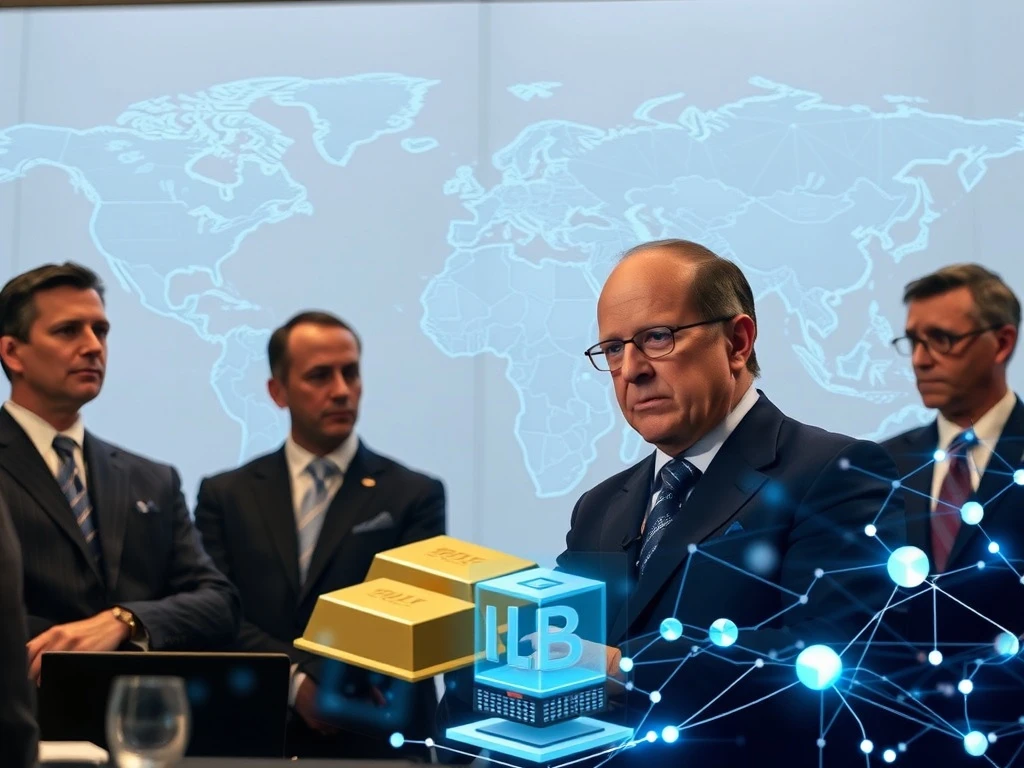BlackRock CEO Reveals **Profound** Central Bank Question: The Tokenization Revolution

In an era marked by shifting global financial landscapes, a crucial insight from the world’s largest asset manager has emerged. BlackRock CEO Larry Fink recently highlighted a pivotal question on the minds of central bankers worldwide: the transformative role of tokenization. This discussion comes as investor concerns about global financial stability grow, positioning both crypto assets and gold as ‘assets of fear.’ This sentiment reflects a deep-seated worry about the debasement of traditional assets and the future of financial security.
BlackRock CEO Larry Fink: Crypto and Gold as ‘Assets of Fear’
During the Future Investment Initiative (FII) conference in Saudi Arabia, BlackRock CEO Larry Fink offered a stark perspective on why investors increasingly turn to alternative assets. Fink stated, “Owning crypto assets or gold are assets of fear.” He elaborated that this trend stems from widespread apprehension regarding the potential debasement of traditional assets. Investors, therefore, seek refuge in these alternatives, driven by concerns for both their financial and physical security.
This insight from the BlackRock CEO arrives at a time of notable market volatility. For instance, gold recently experienced a dip, with spot prices falling below $4,000 after reaching all-time highs above $4,377 just a week prior, according to TradingView data. Such fluctuations underscore the prevailing uncertainties that influence investment decisions, pushing more individuals and institutions towards perceived safe havens like gold and various crypto assets.
Addressing U.S. Economic Vulnerabilities: The Dollar’s Reliance
Beyond the immediate market movements, Larry Fink also voiced significant concerns about the structural challenges facing the U.S. economy. His primary worry centers on the nation’s substantial dependency on international investors to purchase U.S. dollars.
Fink explained, “We still are a nation that needs 30% to 35% of all our Treasury sales going overseas, and, to me, that’s the biggest issue today.” This reliance creates a significant vulnerability. He warned that any shift in this dynamic could trigger a profound “multiplier effect” due to the entrenched dependency on foreign buyers of dollar-based assets. Fink urged a concerted effort to unlock private capital to mitigate this risk and foster greater economic resilience.

Central Banks’ Pivotal Question: The Tokenization Revolution
A key revelation from Fink concerned the escalating gold purchases by global central banks, marking a significant shift in global finance. These institutions are grappling with complex questions about the future of money and assets. Fink revealed their most pressing inquiry: “I would say the biggest question from central banks is what role tokenization and digitization will play.”
Central bankers face numerous challenges in navigating the rapidly evolving tokenization industry. They are actively considering:
- How quickly they should digitize their own national currencies.
- The potential implications of widespread digitization for the U.S. dollar’s global standing.
- The broader impact of these technological shifts on existing payment systems and financial infrastructure.
These questions highlight the profound changes underway as traditional finance intersects with emerging digital technologies.
The Future is Digital: Rapid Tokenization Across Global Finance
Larry Fink believes the speed of this transformation is often underestimated. He asserted, “I think we spend so much time talking about AI. We’re not spending enough time talking about how quickly we’re going to tokenize every financial asset.” This statement underscores his conviction that the tokenization of financial assets will occur globally and at an unprecedented pace.
Furthermore, Fink warned that many countries are “ill prepared for that and under-appreciate how technology is changing that.” This unpreparedness could lead to significant disruptions if nations fail to adapt swiftly. The shift towards digitized assets promises to redefine ownership, transferability, and the very nature of financial markets.

BlackRock’s Strategic View on Crypto Assets and Digital Transformation
Fink’s long-standing perspective on the inevitable tokenization of all traditional financial assets aligns perfectly with BlackRock’s strategic moves. As the world’s largest investment company, BlackRock is also a significant player in the crypto assets space, holding substantial amounts of Bitcoin (BTC) on behalf of its clients. As of October 27, BlackRock’s iShares Bitcoin Trust fund reportedly held 805,806 BTC. This figure represents approximately 26% more than the entire BTC holdings of MicroStrategy, recognized as the world’s largest public holder of Bitcoin.
This demonstrates BlackRock’s active engagement with the digital asset landscape. While Bitcoin’s role as an inflation hedge remains debated, its performance often correlates with fluctuations in the U.S. dollar. This further solidifies its position as a key asset in discussions surrounding global financial stability and investor fear. The insights from the BlackRock CEO provide a clear signal: the future of finance is inextricably linked to digital transformation and the evolving role of crypto assets.
The insights from BlackRock CEO Larry Fink paint a clear picture of the evolving global financial landscape. Central banks are not merely observing; they are actively questioning the profound implications of tokenization and digitization. As gold price movements and the rise of crypto assets reflect underlying fears about financial stability, the urgency for nations to prepare for a tokenized future becomes undeniable. BlackRock, with its immense influence and significant crypto holdings, stands at the forefront of this revolution, guiding the conversation towards a more digitally integrated financial world.







